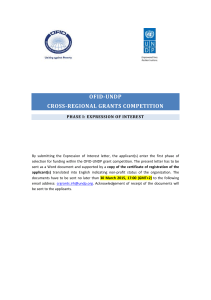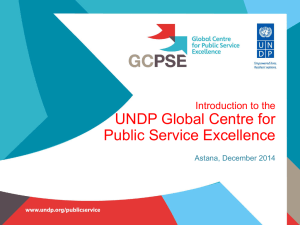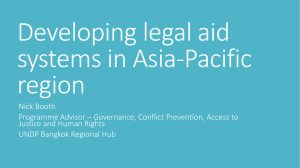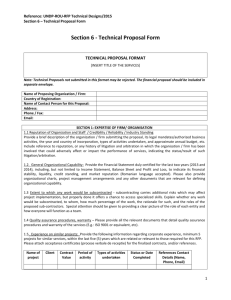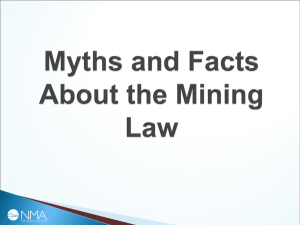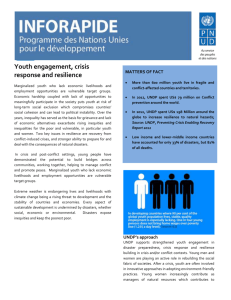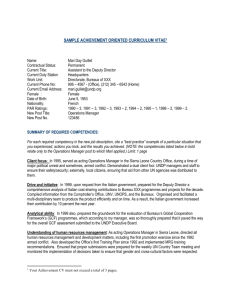Project_Doc_Minerals_Lesotho
advertisement
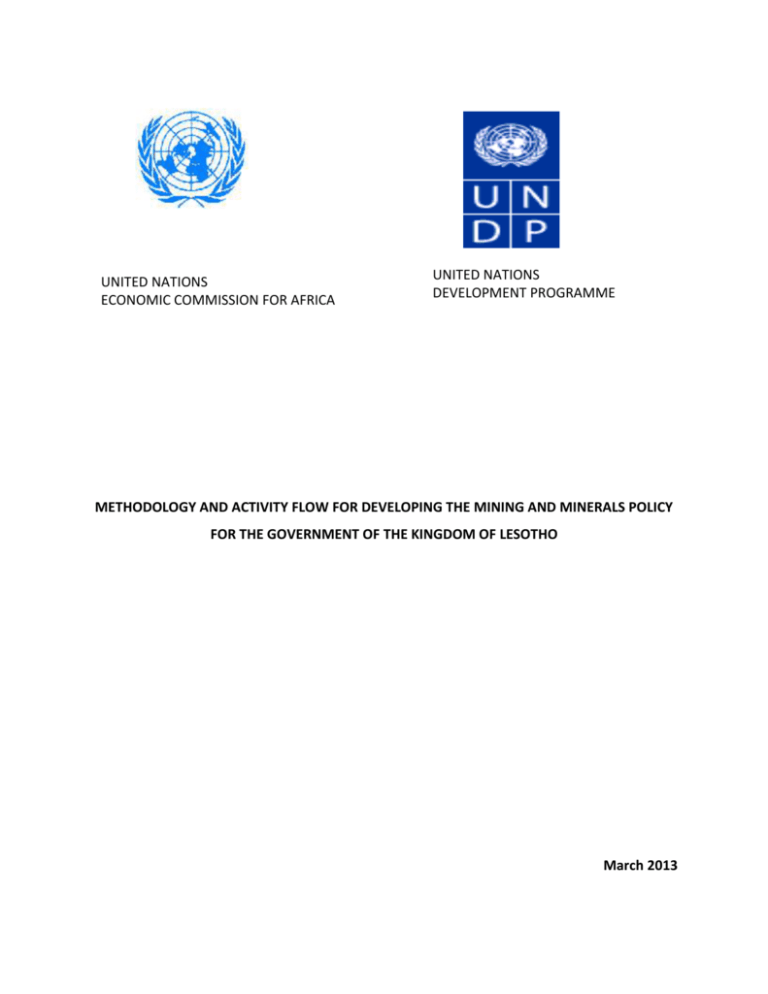
UNITED NATIONS ECONOMIC COMMISSION FOR AFRICA UNITED NATIONS DEVELOPMENT PROGRAMME METHODOLOGY AND ACTIVITY FLOW FOR DEVELOPING THE MINING AND MINERALS POLICY FOR THE GOVERNMENT OF THE KINGDOM OF LESOTHO March 2013 Table of Contents 1 BACKGROUND ....................................................................................................... 3 2 OVERALL OBJECTIVE ............................................................................................ 4 3 METHODOLOGY ..................................................................................................... 4 3.1 Preparation of local and international background reports ................................. 4 3.2 Pre-workshop preparations ................................................................................ 6 3.3 The first workshop .............................................................................................. 6 3.4 Stakeholder consultations .................................................................................. 6 3.5 The second workshop ........................................................................................ 7 3.6 Final review meeting .......................................................................................... 7 4 MANAGEMENT OF THE PROCESS ....................................................................... 7 a. Ministry of Mining ............................................................................................... 7 b. UNECA and UNDP ............................................................................................ 7 c. Southern Africa Resource Watch (SARW) ............................................................ 7 d. 5 Consultants ........................................................................................................ 8 ACTIVITY FLOW AND ESTIMATED COSTS .......................................................... 8 Annex 1 – Work flow of the Lesotho Mining and Minerals Policy project......................... 9 Annex 2 – Cost estimates for developing the Lesotho Mining and Minerals Policy ...... 11 2 1 BACKGROUND The Government of the Kingdom of Lesotho, through the recently created Mining Ministry, requested for technical assistance from the United Nations Economic Commission for Africa to develop a National Mining and Minerals Policy (NMMP). The policy is expected to support sustainable socio-economic growth and development, as well contribute to alleviating poverty. This is in line with the aspirations of the country’s National Strategic Development Plan (2012/13 to 2016/17), and Vision 2020 upon which the Strategy is founded. The NSDP specifically identifies mineral exploitation as one of the main accelerators of growth and development, through increased tax and export receipts, and a higher contribution to GDP. In response, the Economic Commission for Africa developed a technical proposal to guide the Lesotho policy development process. ECA also mounted a scoping mission to Maseru in December 2012 to develop a first hand understanding of the request as well as agree on roles and responsibilities, and methodologies to be employed. Following the mission, the Lesotho Minister of Mining submitted a detailed request for Technical Assistance to the Executive Secretary of ECA, outlining resource requirements for the assignment. The Minister’s request underscored the urgency of undertaking the assignment to ensure that Lesotho fully benefits from the exploitation of its mineral resources. The Executive Secretary has since responded to the Minister’s request, reaffirming ECA’s commitment to developing the Lesotho Mining and Minerals policy, and to commence the project as soon as possible. Parallel to the above processes, the Ministry separately discussed possible technical assistance with the United Nations Development Programme (UNDP) and the World Bank; this assistance includes mineral policy development, among other needs. The Government has expressed the desire for collaboration between these organisations with UNECA in the policy making process. Exploratory discussions, to jointly execute the project, have been held between UNECA and the World Bank, on the one hand, and with UNDP, on the other. Broad agreement has been reached with UNDP to execute the project together. A virtual planning meeting with UNDP has discussed possible roles and responsibilities and these are reflected in this proposal. Both UNECA and UNDP see the Lesotho policy project as a test case in the wider context of joint work to implement the Africa Mining Vision (AMV) through the African Minerals Development Centre. This is currently under establishment at ECA. The AMV argues for a mineral sector anchored around long term economic and social development to support human development. To this end, UNDP has developed a Strategy for “Harnessing Extractives for Human Development” to principally address Africa’s intractable poverty and the achievement of the MDGs. The project will be migrated to the AMDC once the latter is operational. Clearly therefore both the UNDP and UNECA realise the importance of the Lesotho project and have agreed to pool their comparative strengths to realise the project objectives. However, UNDP and UNECA are not the only role players in this area. The Southern Africa Resource Watch has been active in community work in Lesotho and has agreed to be part of the project. The African Development Bank too has expressed the desire to participate in the project 3 pending the outcome of their internal processes. The World Bank could also participate once their own internal processes are concluded. It is clear, therefore, that the Lesotho project has the potential for much wider collaboration. This augurs well as beyond policy making, there will be need to develop and implement the legal and regulatory framework. This is likely to require a much broader integrated approach to development in Lesotho, as well as wider partnerships. Besides, a number of countries have expressed the desire to develop AMV compliant policy, legal and regulatory frameworks. The broader partnerships should hence prove useful. 2 OVERALL OBJECTIVE The overall objective of the assignment is to assist the Government of the Kingdom of Lesotho to develop a Mining and Minerals Policy to provide a strategic framework for developing the country’s minerals sector. The Policy should be consistent with the Government’s overall strategic policy objectives outlined in Vision 2020 and the National Strategic Development Plan. Thus the policy should contribute to sustainable economic growth and development and the alleviation of poverty. The Policy should also be consistent with the principles of the AMV and support broader economic and social development objectives. 3 METHODOLOGY The methodology outlined below has been shared with, and agreed to, by the Lesotho Government. Its main principles are that the policy making process is transparent and fully participatory, and includes broad stakeholder consultations. The process is hence rooted in collective national ownership. The proposed methodology has successfully been employed in the development of the: Malawian Mining and Minerals Policy white paper1; the Namibian Energy, as well as Mining and Minerals Policies; and the South African Energy, and Mining and Minerals Policy white papers. The main steps in the methodology (see Figure 1) are: 3.1 Preparation of local and international background reports Two study reports will be prepared as inputs into the consultative workshops. These are the: Local scan - this is essentially a detailed analysis of the national economic and social landscape, including attributes of the mineral sector. These are: geological potential; current mining operations; relevant policies and Acts governing the sector; its place in the national economic and social development plans; as well as the challenges the sector faces. This level of situational analysis requires intimate local level knowledge and is probably best undertaken by a local Consultant under UNDP’s leadership. The work is likely to require inputs from several local experts. 1Used by the Minerals and Energy Policy Centre in South Africa 4 Figure 1- Methodology for developing the Lesotho Mining and Minerals Policy Best practices scan, regionally & internationally Local Scan of current situation, literature Survey National Economic Scan Working Group Workshop 1 to identify key issues based on diagnosis of documents; SWOT and scenario analysis to develop draft policy solutions using STEEP for input into Green Paper Multi-Stakeholder Workshops to provide feedback to the Government Green Paper Working Group Workshop 2 to provide inputs into the draft white paper and develop strategy for implementing the Policy Draft White Paper on Minerals and Mining Policy Final Review and presentation to Government Regional and international report – this will review global mineral development trends and current best practice including: policy and legislative trends; investment climate and legal and regulatory frameworks; and community, environmental and social development trends. The report will also review relevant sub regional (SADC) and continental (Africa Union) strategies of potential influence on the Lesotho Mining and Minerals policy. The main aim is to identify key external drivers to the sector and their likely impact on Lesotho’s minerals sector. UNECA will lead the regional and international scans. 3.2 Pre-workshop preparations The key initial task is to establish a representative stakeholder working group of about 40 people from different constituencies. This should include representatives from: the Ministries of Mines, Economic Development, Finance, Environment, and Industry; research and academic organisations; the private sector; communities affected by mining; NGOs/CSOs; and small scale miners. The reports from the local and international scans will be shared with the working group for review before the First Workshop to facilitate their effective participation. Ideally, each stakeholder group should prepare a position paper for the first workshop. 3.3 The first workshop The first workshop aims to build consensus on a range of diverse views on key issues and challenges confronting the sector. The workshop should identify solutions to these challenges which should then form part of the initial draft policy (green paper). The main elements of the workshop are: Situation analysis – the Working Group will review the domestic and international reports, and against a SWOT analysis, examine both the internal and external environments to match the external threats and opportunities with internal weaknesses and strengths. A STEEP analysis (of social, technological, economic, environmental and political issues) will be used to identify the major constraints facing the sector. Scenario analysis - scenario analysis on possible futures will help identify new opportunities and threats. It will examine how key issues are likely to behave in an uncertain future. This is important for identifying uncertainties in the future, generating new ideas, and adapting to change in light of emerging opportunities and threats. It is also useful for generating and testing the robustness of policy intervention strategies. First draft of policy statements - This will involve the consolidation of the key issues identified and the development and prioritisation of solutions to them. The solutions so developed will form the basis of the first draft policy statements. The first workshop will require two facilitators, one of whom is conversant with scenario planning. It is also proposed that UNDP takes the lead in organising both the first and second workshops. 3.4 Stakeholder consultations The first draft policy document will be circulated to a wide stakeholder audience to solicit written inputs. The draft will also be subjected to regional and district level workshops to obtain inputs, comments and recommendations. These will be incorporated into a second 6 draft policy document, which will be circulated to the Working Group prior to a second workshop. All in all, ten consultative workshops are planned. 3.5 The second workshop The second workshop will further review, distil and consolidate the views, comments and suggestions from the stakeholder for inclusion into the draft policy. The outcome of the workshop will be a third draft Mining and Minerals policy (draft White Paper). The workshop will also develop strategies or a Strategic Framework for the implementation of the Mineral Policy. The Strategic Framework will be used for developing an Implementation Plan. 3.6 Final review meeting The third draft Mining and Minerals Policy document, and the Strategic Framework, will be reviewed and validated by a selected small group of stakeholders prioir to presentation to Cabinet. 4 MANAGEMENT OF THE PROCESS a. Ministry of Mining The Ministry of Mining will need to establish a Mineral Policy and Strategy Task Force, preferably under the Chairmanship of a senior member of Staff of the Ministry. The task Force will oversee and manage the policy development process on behalf of Government and will be responsible for all the deliverables arising from the process. This includes the responsibility of briefing Government regularly, organizing regular project review meetings by the Task Force itself, organizing stakeholder meetings, ensuring documents are dispatched to stakeholder meetings, processing and translating documents and generally providing secretariat services to the process. The Mineral Policy and Strategy Task Force should ideally meet once every month. b. UNECA and UNDP The United Nations Economic Commission for Africa (UNECA), through the African Minerals Development Centre (AMDC), will be the overall Project Manager for the assignment, and will work with the ECA Sub Regional Office for Southern Africa and the United Nations Development Programme (UNDP) Office in Maseru. UNECA and UNDP will provide technical backstopping to the Government’s Mineral Policy and Strategy Task Force as well as recruit and supervise the consultants on behalf of the project. c. Southern Africa Resource Watch (SARW) 7 SARW has been working with stakeholders in Lesotho on various initiatives and have developed networks useful to the project. SARW will provide networking capacity and supervision of the stakeholder engagement processes. d. Consultants Local consultants will be required to prepare the local background report on Lesotho. Workshop 1 will require a Facilitator (main Consultant to the project) and note takers, as well as a person with scenario planning skills. Workshop 2 will just require the Facilitator and his team. All the stakeholder and community workshops will require a Facilitator and note takers. The Lesotho background document will require inputs from several people knowledgeable in aspects of the Lesotho mining sector (eg a geologist, mining lawyer, environmental consultant, HR consultant, etc) ECA will provide support to prepare the international and regional scans. 5 ACTIVITY FLOW AND ESTIMATED COSTS Annex 1 shows a work flow (Gantt chart) and preliminary schedule for developing the Lesotho Mining and Minerals Policy. The work flow assumes that the work will commence in April 2013 as requested by the government of the Kingdom of Lesotho. Annex 1 show that the project is likely to take about eight months to execute. The work flow has yet to be optimized; hence this period is a preliminary estimate. Based on Annex 1, the key milestones are the delivery of the draft Green Paper around about July 2013, and the draft White Paper at the end of December, 2013. The estimated budget for the project is USD 330,000. This budget has been distributed among the three main partners; namely the Government, UNECA and UNDP. The budget mainly includes project management costs, extensive stakeholder consultation processes, hire of consultants and reporting costs. The budget will need to be agreed to by the partners prior to the commencement of the project. 8 Annex 1 – Work flow of the Lesotho Mining and Minerals Policy project 10 Annex 2 – Cost estimates for developing the Lesotho Mining and Minerals Policy ACTIVITY DESCRIPTION Freq Quantity Unit cost USD Days Travel USD Total USD Financing source 1 Project management costs 1.1 Establish project task force Govt 1.2 Maintain project secretariat Govt 1.3 Attend project launch 1 3 100 3 3000 3900 ECA 1.4 Attend project review meetings 8 3 100 3 24000 31200 ECA 1.5 Present Green Paper to Government Task Force 1 3 100 3 3000 3900 ECA 1.6 Present revised policy document to Government Task Force 1 3 100 3 3000 3900 ECA 1.7 Present draft White Paper to Government Task Force 1 3 100 3 3000 3900 ECA 1.8 Present final White Paper to Government Task Force 1 3 100 3 3000 3900 ECA Sub-total 2 2.1 2.1.1 50,700.00 Prepare background reports Prepare local scan Lead Consultant (Economist) 1 1 300 30 9000 UNDP 2.1.2 Geologist 1 1 300 15 4500 UNDP 2.1.3 Mining consultant 1 1 300 15 4500 UNDP 2.1.4 Mining lawyer/tax specialist 1 1 300 15 4500 UNDP 2.1.5 Environmental specialist 1 1 300 15 4500 UNDP 1 1 2.2 Prepare regional and international scan Sub-total 3 3.1 ECA 27,000.00 Convene first stakeholder meeting Circulate agenda and working document Govt 11 3.2 Secure workshop venue 1 1 706 2 1412 Govt 3.3 DSA for participants 1 50 100 5 25000 UNDP 3.4 Participation by ECA Secretariat 1 3 100 6 4800 ECA 3.5 Hospitality (lunch and tea) 1 100 31 5 15500 Govt 3.6 Communications and transport 5000 Govt 3.7 Prepare working document (Lead Project Consultant/Facilitator) 3.8 Service workshop 3000 1 1 600 5 3000 UNDP 3.8.1 Lead Project Consultant/Facilitator 1 1 600 5 3000 UNDP 3.8.2 Note takers 1 2 200 5 1000 UNDP 3.8.3 Scenario Analyst 1 1 500 5 2500 UNDP 3.8.4 Note takers 1 2 200 5 1000 UNDP 3.8.5 Travel and DSA for facilitators 1 6 100 5 7000 UNDP 4000 Sub-total 69,212.00 4 Prepare first draft policy document 4.1 Collate outputs from first workshop 1 1 600 5 3000 UNDP 4.2 Prepare draft Green Paper 1 1 600 5 3000 UNDP 4.3 Present draft Green Paper to Government Task Force 1 3 100 3 3900 ECA 3.5 Edit, translate and print draft Green Paper Govt Sub-total 5 3000 9,900.00 Convene regional consultative workshops 5.1 Circulate draft Green Paper 5.2 Advertise/publish notices of workshops 5.3 Secure workshop venues 5.4 Service consultative workshops Govt Govt 1 10 706 3 21180 Govt 5.4.1 Workshop Facilitator 1 10 300 3 9000 Govt 5.4.2 Note takers 1 20 200 3 12000 Govt 12 5.5 Participation by ECA Secretariat 1 10 100 3 5.6 UNDP participation 1 10 100 3 10000 Sub-total 6 ECA 3000 UNDP 58,180.00 Prepare second draft policy document 6.1 Collate outputs from workshops (Facilitators) 1 10 300 5 6.2 Prepare second draft policy document (Lead Project Consultant) 1 1 600 5 6.3 Present second draft policy document to Government Task Force 1 3 100 3 3000 Sub-total 7 13000 15000 Govt 3000 UNDP 3900 ECA 21,900.00 Convene second stakeholder meeting (WG) 7.1 Circulate agenda and draft policy document Govt 7.2 Secure workshop venue 1 1 706 2 1412 Govt 7.3 DSA for participants 1 50 100 3 15000 ECA 7.4 Participation by ECA Secretariat 1 3 100 4 4200 ECA 7.5 Hospitality (lunch and tea) 1 100 31 5 15500 Govt 7.6 Communications and transport 5000 Govt 7.7 Service workshop 3000 7.7.1 Lead Project Consultant/Facilitator 1 1 600 3 1800 UNDP 7.7.2 Note takers 1 2 200 3 600 UNDP 7.7.3 Travel and DSA for facilitators 1 3 100 4 4200 UNDP 3000 Sub-total 8 47,712.00 Prepare draft White Paper 8.1 Collate outputs from second workshop (Lead Project Consultant) 1 1 600 5 3000 UNDP 8.2 Prepare draft White Paper 1 1 600 5 3000 UNDP 8.3 Present draft White Paper to Government Task Force 1 3 100 3 3900 ECA Sub-total 9 3000 9,900.00 Convene review/validation meeting 13 9.1 Circulate agenda and draft White Paper Govt 9.2 Secure workshop venue 1 1 706 3 9.3 Participation by ECA Secretariat 1 3 100 4 9.4 Hospitality (lunch and tea) 1 30 31 5 9.5 Communications and transport 9.6 Service review meeting 3000 2118 Govt 4200 ECA 4650 Govt 5000 Govt 9.6.1 Lead Project Consultant/Facilitator 1 1 600 3 1800 UNDP 9.6.2 Note takers 1 2 200 3 600 UNDP 9.6.3 Travel and DSA for facilitators 1 3 100 4 4200 UNDP 1 1 600 5 3000 UNDP 9.7 Compile final White Paper (Lead Project Consultant) 3000 Sub-total 10 25,568.00 Present final White Paper to Government Task Force 10.1 ECA participation 1 3 100 4 3000 4200 ECA 10.2 UNDP participation 10.3 Hospitality (lunch and tea) 1 3 100 4 3000 4200 UNDP 1 10 31 5 1550 Govt Sub-total 9,950.00 GRAND TOTAL 330,022.00 ECA Contribution Government Contribution UNDP Contribution 107,800.00 114,322.00 107,900.00 14



